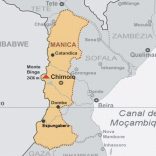Maputo says it is protecting Mozambican interests in dispute with Galp
Government insists on cabotage as a valid alternative for transport logistics

(FILE PHOTO: for illustration purposes only)
The Mozambican government is pushing forward with legal and fiscal incentives to help cabotage [coastal freight shipping] attract operators interested in exploring transport alternatives, considering the local relevance of rail and port services.
These are statements made this Thursday to journalists by the Deputy Minister of Transport and Communications, Amilton Alissone, who made known the government position at the XXVI Council of Directors of the Railways of Mozambique (CFM) in Matibane, Nampula province.
The focus is on finding mechanisms to make cabotage competitive. Coastal shipping is being branded as “Road Number Zero”, in imitation with the road and rail corridors already in operation.
“Our corridors were essentially designed for the transport of cargo, which is why this service, at the moment, bears a lot of responsibility in the country,” Deputy Minister Alissone said.
“It is time to devise a new paradigm in order to conceive the most sustainable mechanism for establishing [cabotage] as a backbone,” he stressed.
The minister highlighted some of the measures taken by the government as part of this ongoing approach.
“The government has been implementing different measures to ensure that cabotage becomes as competitive as possible. We must establish incentives so that cabotage operators feel challenged to offer the service in a sustainable way,” he explained.
He argued that, in order to complement rail and port services, it was necessary to invest in efficient logistics, with a sustainable model for cabotage.
Amilton Alisson said that, in the CFM’s view, Mozambique was consolidating its strategic logistics position in the region, providing increasingly competitive services as a result of ongoing investments in the rail and port system under the government’s 2020-2024 Five-Year Programme.
“The country is implementing a vast program of rehabilitation and expansion of rail and port infrastructure, including the acquisition of rolling stock, to reinforce the company’s capacity to transport people and goods in Mozambique and throughout the region,” he detailed.
Alisson said that, “in addition to ongoing interventions to improve rail and port infrastructure, reforms are under way to make the Maputo, Beira and Nacala development corridors more competitive and efficient”.
He noted that the previous CFM executive had last year implemented an initiative to remove physical borders in the rail transport of goods on the border with the Kingdom of Eswatini at Ressano Garcia, an initiative to be expanded to borders in the Beira and Nacala corridors presently.
The XXVI CFM Board of Directors meeting ended on Saturday.













Leave a Reply
Be the First to Comment!
You must be logged in to post a comment.
You must be logged in to post a comment.